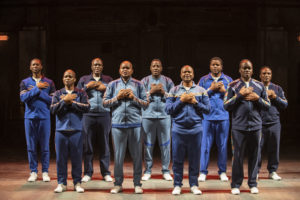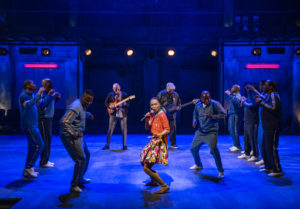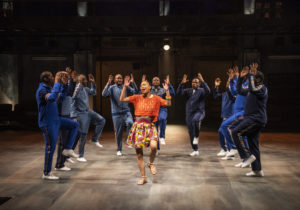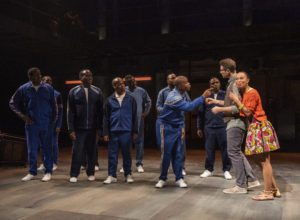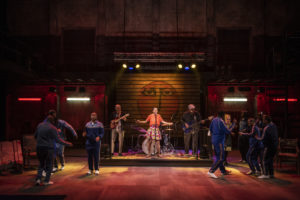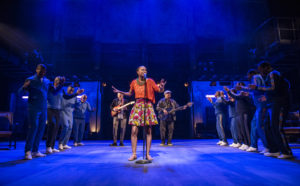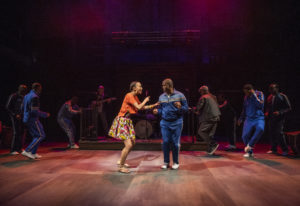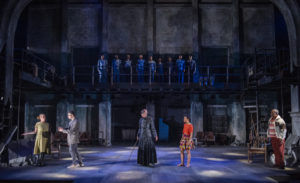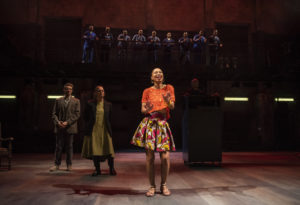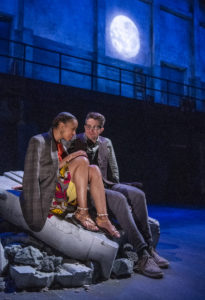THE PLOT THIN-ENS
Can lightning strike thrice? Over two decades later, it’s happened again — a third collaboration between author/director Eric Simonson and the world-famous, nine-member Ladysmith Black Mambazo. Like The Song of Jacob Zulu in 1992 and Nomathemba in 1996, Steppenwolf Theatre Company’s world premiere Lindiwe, co-directed with Jonathan Berry, is imbued with the ensemble’s seamless a cappella harmonies, playful grace, and propulsive dance routines, theatrical enough in their own irrepressible right.
If the former celebrations were set in the troupe’s native South Africa, Lindiwe goes further. Building musical bridges between their Durban and Steppenwolf’s Chicago, it links Zulu culture with Windy City blues. Happily, we get no melioristic attempts at blending these distinctive sounds into a greater whole. Their differences provide the requisite edges and excitement.
Less successful is the love story that Simonson conceived to connect these worlds: a messy amalgam of the legend of Orpheus and Eurydice and the last act of Carousel. “A South African siren,” Lindiwe (the vibrant Nondumiso Tembe) is a featured singer with Ladysmith Black Mambazo who meets a Lincoln Park drummer named Adam (charismatic Erik Hellman). Fraught with career conflicts, homesickness, and creative differences, their very recognizable attempts to make music and love culminate in a car crash.
Very quickly a conventional story of opposites who attract turns weird: The diabolical Keeper (Yasen Peyankov, neurotically nasty) erupts to cast a spell over these supposedly dead lovers, as well as Adam’s supportive Aunt Clarisse (Jennifer Engstrom) and Mkhulu (Cedric Young), Lindiwe’s wise elder of a grandfather. With irritating arbitrariness, this self-appointed lord of the underworld demands that they recount their story leading to the accident. Our snarling inquisitor forces them to reenact flashbacks that depict their spats as much as their artistic partnership.
It seems that Keeper, who had lost the love of his life and with it any purpose to persist, envies these happy music-makers. When their reluctance to find fault with each other becomes too much to take, he decides to separate them, freeing Lindiwe from this limbo but forbidding her to sing, just talk. (If he can’t hear his late lover sing, Lindiwe must be silenced too.)
If the Keeper’s gratuitous cruelties make little sense, the fix for his curse is just as implausible. But, two hours in, we get an unearned happy ending: A full-throated Lindiwe joins her Ladysmith Black Mambazo to belt out “Sweet Home Chicago” at the Kingston Mines club. (An earlier blues treat was the infectious “Caldonia” from 1945.) In enthralling contrast, the music of LBM provides superb back-up for the lovers, reflecting each turn of their romance with warmth and gusto.
Lindiwe is played out in set designer Collette Pollard’s gloomy gutted factory, where limestone fragments date back to Chicago’s Great Fire. The setting is as much a downer as the Keeper himself. Given the crack-brained plot and dour setting, Lindiwe is a show that makes an audience work overtime to enjoy it.
What redeems it — necessarily more so than in the last two Steppenwolf offerings — is the concert within the play. You can’t stop the music even if you can’t stand the plot.
Lindiwe
Steppenwolf Theatre Company
Steppenwolf’s Downstairs Theatre
1650 N Halsted Street
ends on January 5, 2020
for tickets, call 312.335.1650 or visit Steppenwolf
for more shows, visit Theatre in Chicago

